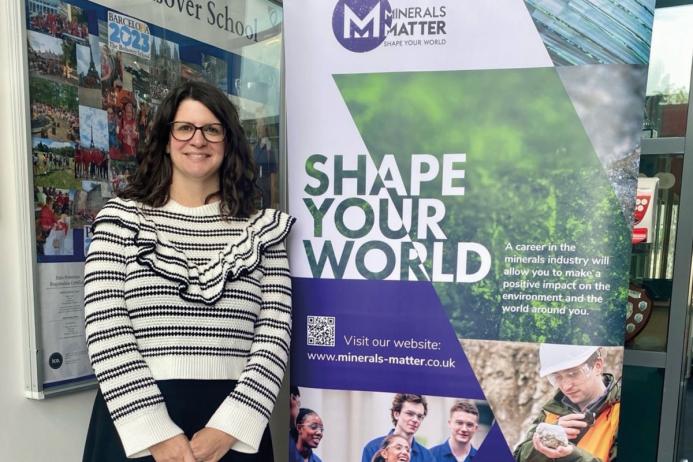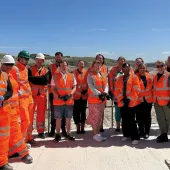100 Ambassador Ambition for Minerals Matter

First published in the October 2024 issue of Quarry Management
Target set to recruit industry professionals to tell their stories of working in minerals products to schools and further education colleges
Minerals Matter, the strategic industry approach aimed at engaging with the next generation of workers, has set a target of recruiting 100 Ambassadors by the end of 2024.
With a crucial role to play in the future success of the mineral products sector, recruiting industry professionals to tell their stories of working in minerals products is critical to enable engagement with primary and secondary schools, as well as further education colleges.
‘100 Minerals Matter Ambassadors by the end of the year will ensure that 2025 can be a very productive year for raising awareness of the career opportunities within the sector. It is direct engagement with young people that is the most inspiring and has the most lasting effects. Currently, our 60 Ambassadors are making a real difference, demonstrating that our sector is diverse, inclusive, and actively solving the sustainability, net-zero, and regeneration challenges that young people are passionate about,’ said Hannah Higley, future careers co-ordinator with Minerals Matter.
Minerals Matter works with partners including STEM Learning UK, Engineering UK, and Careers & Enterprise Company, and has support from leading industry bodies including The Institute of Asphalt Technology, Mineral Products Qualifications Council, Institute of Quarrying, Mineral Products Association, British Aggregates Association, as well as national and independent operators.
Succession is a now issue
As an industry, there are immediate pressing challenges in recruiting the necessary skills, particularly technical and operational skills. The sector will lose more skills and experience in the next 10 years. The average age of a worker in the mineral products industry is 56, so the industry is facing a future of highly skilled employees retiring.
There are also challenges of change, such as increased digitalization and automation, both of which require new skill sets. Also, staff who are knowledgeable in sustainability, decarbonization, recycling, and renewable energies will be in high demand. The industry will need greater innovation, more diversity of thought, as well as creativity in developing efficient solutions.
It is, therefore, imperative to build the talent pipeline to ensure that the industry is sustainable for the future, and critical that we take collective responsibility for attracting new people. Engaging a more diverse workforce and ensuring inclusivity will be key.
The sector needs to positively raise awareness of the industry and educate on the critical nature of the sector and the vital part we play supporting everyday living, explain the range of career opportunities available, and encourage people to join us.
‘It’s imperative that we connect with young people and adults to highlight the variety of career pathways within the mineral products sector. It is a time-sensitive mission. Almost 10 million people in UK employment are over the age of 50, equivalent to more than 30% of the workforce. Succession is, as a result, profit, loss, and survival,’ added Ms Higley.
Positive stories to tell
Despite the many challenges, the mineral products sector is well placed, with positive stories to tell on net-zero targets and making real-time interventions that are meaningful for sustainability and biodiversity. The sector is a good match for the career aspirations of younger people, so long as the word gets out.
Leading from the front
Momentum to create sustained engagement with students will need to be driven by business leaders and senior managers, creating encouraging and facilitating cultures where staff feel free to get involved as ambassadors, as part of company volunteering and recruiting efforts. It is also critical that we continue to train through apprenticeships, vocational qualifications, and university study. Workplace support and mentoring is also invaluable.
‘As an ambassador, you might take part in a career fair or mock interviews, or give a talk on your own career. If an ambassador can give just half a day a year to support Minerals Matter, we will be one step closer to developing the succession we need,’ added Ms Higley.
For more information and resources, including how an individual can register as a Minerals Matter Ambassador, visit: www.minerals-matter.co.uk/stem/
Subscribe to Quarry Management, the monthly journal for the mineral products industry, to read articles before they appear on Agg-Net.com








